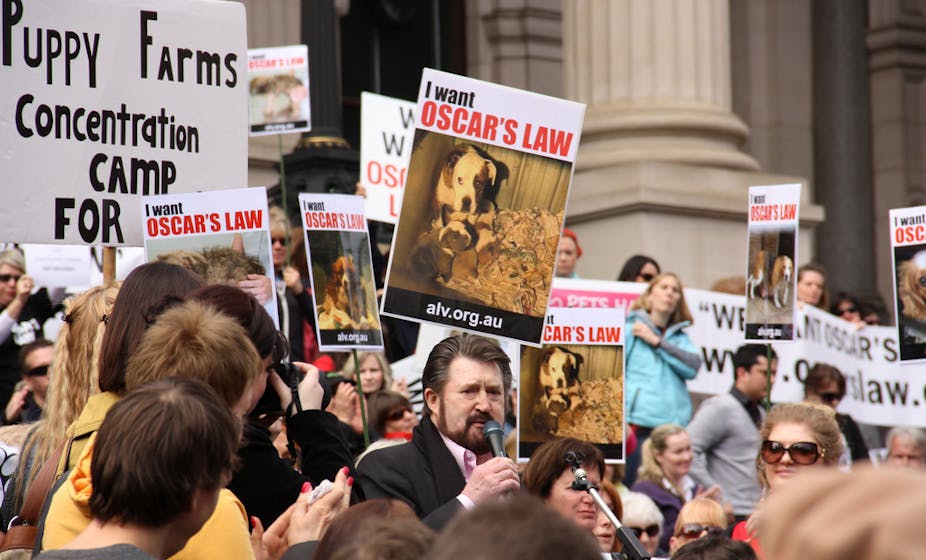I may be wrong, but recent indicators suggest animal suffering is going out of fashion.
I have been tracking the ebb and flow of the animal protection movement as a first-hand observer since the late 1990s. I have also conducted historical research into the contemporary animal protection movement which emerged in the 1970s; and the early-modern animal protection movement of the Victorian era.
Unless I am mistaken, the community seems increasingly unimpressed by animal suffering.
On September 18, around 5,000 people rallied on the steps of Victoria’s Parliament House. Speaker after speaker took to the microphone to condemn puppy mills.
Also know as puppy factories, these mills are often backyard operations, located on city fringes, where breeding adults dogs live in crowded, anti-social, squalid conditions.
It is the dogs’ job to produce puppies; puppies that are then sold through pet stores, often to impulse buyers.
The system has a number of problems:
- the breeding animals live in poor conditions;
- once the thrill of the impulse purchase wears off, many young dogs find themselves at the local pound;
- regulation is poor, as authorities aren’t easily able to keep breeders in check.
On September 18, protesters came in their thousands, many with dogs in tow. They called for an end to puppy farms and did so under the banner of “Oscar’s Law”.
The “law” is named in honour of Oscar who survived five years as a stud dog, and was rescued twice by Debra Tranter, the driving force behind Oscar’s Law.
All kinds of people were gathered on the steps of Parliament House: this wasn’t a fringe group of animal liberationists. They cheered for Debra and booed the Baillieu Government’s representative who spoke of greater regulation to stop rogue operators.
Legislation to get tough on puppy factories is consistent with the Baillieu Government’s pre-election promise. But it is not consistent with Oscar’s Law, which calls for an end to all puppy mills and a prohibition on the sale of dogs through pet stores.
But while the Oscar’s Law crowd was impressive, it could not out-do the show of support Animals Australia and the RSPCA received when they asked people to rally around Australia in opposition to live animal exports.
On August 14 an estimated 20,000 people rallied around Australia and it was standing room only on the steps of Victoria’s Parliament House.
The crowds, the letters, the emails and the petitions all suggest one thing: the community is not impressed by animal suffering.
Meanwhile, hen producers and chicken meat sellers feel they must spend time and money communicating a “free to roam” or “no cages here” message to the community. And the speed with which an apparently small army of animal lawyers challenged the legitimacy of those advertising campaigns, seems very telling.
Likewise, community support for jumps racing and duck shooting does not appear to be growing. Rather, those who have always opposed those practices still oppose them, and their numbers continue to swell as others decide they too must speak out.
Of course, legislative change is slow, if it occurs at all. Animal advocates know this, and at the rally for Oscar’s Law many speakers made reference to the need for community-level change. Given the number of community members apparently concerned enough to take to the streets, that change may be afoot.
It does seem as though the tide is turning against animal suffering. I will be very interested to see whether the trend continues and where it takes us.

